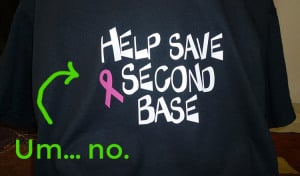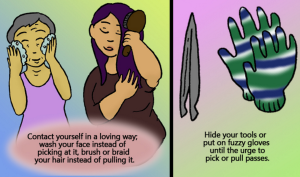
Portrait of a person smiling.
You’ve likely heard the saying, “Prostitution is the world’s oldest profession.” And yet, despite this truth, our society has always looked down on sex workers and many still assume that all sex workers do their jobs out of desperation or because they were forced into it.
Unfortunately, the #MeToo movement is fueling new misconceptions about sex workers. Some uninformed social media users have suggested that the solution to stopping sexual predators is for them to hire a sex worker when they want to abuse.
This so-called solution is not only dehumanizing, it is false; sex workers are not target practices for sexual abusers.
In fact, sex workers are more likely to experience sexual violence on the job than those engaging in other types of work. However, I’ve seen very little in the media about how they are being impacted by #MeToo.
As a survivor, I deeply appreciate how #MeToo has empowered fellow survivors to publicly share their stories. However, the glaring absence of sex workers’ #MeToo narratives in the spotlight troubles me, especially as an on and off burlesque performer.
Burlesque is a type of sex work, which is defined by the Sex Workers Outreach Project-USA (SWOP) as “any type of labor where the explicit goal is to produce a sexual or erotic response in the client.” I don’t consider it my profession, but I’ve unapologetically participated in sex work.
Sex workers use their bodies to make money like any other worker but aren’t afforded the same rights and protections. I believe the first step to ending sexual violence against sex workers is acknowledging their labor as valuable.
Briq House, communications director at SWOP-USA, does sex work because she enjoys it and thinks of her labor as sacred. Based in Seattle, she’s a Black bisexual queer sex worker, intimacy coach, burlesque performer/producer, teacher, and artist.
While Briq House loves her work, she acknowledges it isn’t always easy. Sex workers are being abused and even murdered on the job. Unprotected by the law, they’re unlikely to report rape and sexual assault to the police. In 2017, nearly 40 sex workers were killed that we know of.
The International Day to End Violence Against Sex Workers has been observed every Dec. 17 since 2003 to commemorate slain sex workers around the world. On this holiday, it’s essential to remember that Black trans woman sex workers are especially at-risk of being killed.
Sex workers are murdered just for doing their job, yet our society lacks empathy for them. They’re the punchline of vulgar jokes, and “prostitute” is the preferred insult of misogynist men towards women.
Briq House explains that sex workers have boundaries like everybody else. They come to a mutual agreement with patrons about what type of interaction both parties are interested in having.
“Every sex worker has boundaries they operate within and communicate to their client. If a client deliberately tries to or succeeds in going past the boundaries that were set by the provider, that is assault,” she says.
Joking about sex workers and diminishing their humanity makes it less safe for them. Queer and trans women of color doing sex work are more likely to be violated than their white counterparts simply because of their identities.
Our culture requires a drastic shift for queer, trans, and People of Color sex workers to feel safe and respected. I’m personally committed to building a world where sex workers are free from all forms of violence.
We must counter their absence within the #MeToo movement by lifting up their stories and supporting them whenever we can. If you are an aspiring ally to sex workers, here are three ways to be in solidarity with them during the #MeToo era:
1. Give money and other resources to sex worker organizers.
Sex workers in the US and beyond have been organizing towards their liberation for decades, yet their movements remain underfunded. If you want to support sex workers, you have to be willing to follow and invest in their leadership and vision.
Being an ally to sex workers means contributing financial and other resources to spaces where they organize. Cris Sardina is the coordinator of the Desiree Alliance, which puts on the largest sex worker conference in the US.
The conference gives sex workers an opportunity to come together in a safer space for five days of organizing, planning and mobilizing to counter the violence, stigma, and criminalization they face in their lives.
In addition to the conference, Desiree Alliance works on the federal level to decriminalize sex work and pushes back against laws that harm sex workers, such as added felony enhancements for working while HIV-positive and anti-trafficking laws that do more harm than good.
Sex workers have systems in place to protect themselves, such as “bad date lists,” which name clients who’ve been known to harm sex workers. An ally’s job is to make sure sex workers have what they need to sustain these types of life-saving grassroots networks.
2. Educate yourself and others about what sex work really is.
The general public needs more education about what sex work is. This is the only way to dispel harmful myths about the job. Sex workers are human beings like everybody else—they’re mothers, fathers, sons, and daughters with full and productive lives.
“Someone you know is a sex worker—someone you love is a sex worker!” says Sardina, who is a sex worker and a great-grandmother.
Sardina thinks that education is the key to people understanding sex work. She wants folks to understand that decriminalizing prostitution is about having the right to choose what to do with your own body without interference from the government.
Sex workers shouldn’t have to carry the burden of educating aspiring allies. If you want to be educated by a sex worker, it’s essential that you pay them for their labor. If you want to start educating yourself, begin here with SWOP’s list of ally resources.
One way to educate others about sex work in your everyday life is intervening when others slut-shame and joke about sex workers. Let them know why their words are dangerous and dehumanizing and ask them to do better.
3. Do something nice for the sex workers in your life.
If you know and love a sex worker, do something nice for them. Their work can be emotionally and physically draining because of how much it’s demonized in our society.
“Sex workers are healers, lovers, companions and trusted allies. The way that we support other leaders in our community who do the work not all of us have the drive or desire to do is the same way we should support sex workers,” Briq House says.
“Give us some love every now and again. We deserve it, and we need it.”
Perform acts of kindness for sex workers in your life so they know you honor and value their labor. Ask them what they need or surprise them with their favorite forms of self-care. Just like any other hard worker, they deserve rest, relaxation and rejuvenation when off-the-clock.
***
Being in solidarity with sex workers during the #MeToo era is crucial. The stories of survivors who are sex workers aren’t being elevated enough right now. We need to prioritize the inclusion of their narratives.
Centering sex workers in the #MeToo movement will amplify the important work of those who are already organizing for sex worker rights, such as SWOP and the Desiree Alliance.
There’s a court case in the 9th Circuit Court of Appeals to decriminalize prostitution and proposals in New Hampshire and Washington, DC to consider decriminalization. With backing from the increasingly powerful #MeToo movement, these efforts could soon become victories.
Until we win better laws for sex workers, we who value them should do what we can to protect their lives. If you love a sex worker, make it your duty to fight for their dignity, safety, and well-being.
[do_widget id=’text-101′]
Neesha Powell-Twagirumukiza (she & they pronouns) is an Everyday Feminism Reporting Fellow. Neesha identifies as an intersectional feminist, womanist, writer, community organizer, facilitator, dancer, freedom fighter, wife, and cat mama. She’s constantly conspiring in the name of liberated Black futures, queer and trans people of color power, solidarity economics, and transformative justice/community accountability. Neesha’s based in a suburb south of Seattle, where she lives, loves, and creates with chosen family.
Search our 3000+ articles!
Read our articles about:
Our online racial justice training
Used by hundreds of universities, non-profits, and businesses.
Click to learn more




















